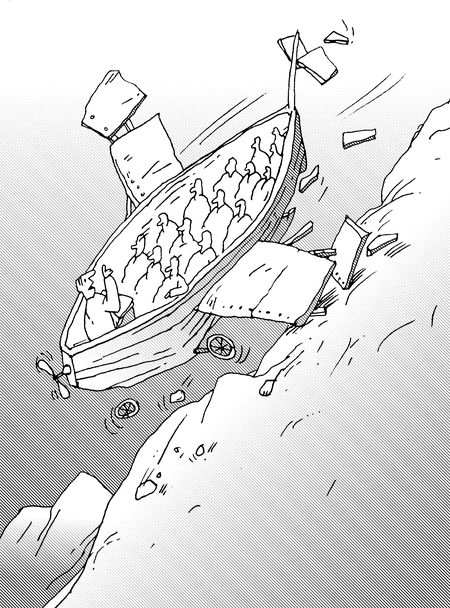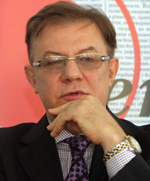Political “nosedive”
Volodymyr LANOVY: “The president will try to let off steam and replace a part of the Cabinet, but we need a professional government that is not based on quotas or composed of MPs”
The economy minister Aivaras Abromavicius’ letter of resignation has clearly raised temperature in the Ukrainian political milieu and society. A latent political crisis, which has already been marked with such things as high-profile statements by, for example, ex-SBU Chairman Valentyn Nalyvaichenko about elite corruption and offshore areas, mutual accusations of top officials, and dismissals of some ministers, is gaining momentum now.
Parliament Speaker Volodymyr Hroisman has commented on the situation as follows: “It is just impossible not notice that we are sinking into a serious political crisis. The first thing we should do is to revise the coalition agreement and the current action plan and, accordingly, to reshuffle the government.”
The president has also taken a step – he met Abromavicius and announced that the latter would stay on in his office, while the National Anticorruption Bureau immediately instituted criminal proceedings after the Lithuanian-born minister’s public statement. Yet Abromavicius himself did not show up the next day either at his ministry or at the Petro Poroshenko Bloc (BPP) faction meeting, where he was invited to. He took a sick leave. Poroshenko also invited the G7 ambassadors, who had supported Abromavicius shortly before, in order to explain to them the further lot of the government and reforms.

Sketch by Anatolii KAZANSKY, from The Day’s archives, 1998
But will the head of state’s tactical efforts solve the problem and will the parliament speaker’s words come true? What are the underlying causes of the political crisis? What is the way out of this difficult situation? We discussed this with Volodymyr LANOVY, ex-minister of economy (1992), president of the Market Reforms Center.
“THE INTERESTS OF THE GOVERNMENT’S RETINUE, I.E. OLIGARCHS, RUN COUNTER TO ECONOMIC DEVELOPMENT AND THE INTERESTS OF SOCIETY”
 “The governmental crisis was inevitable because the Cabinet’s actions have worsened, rather than improved, the situation in this country. The prospect looks bleak, as the economy and finances are still in dire straits, and things may even further worsen in some cases. The root cause of this is the government’s inactivity and ignorance of how to ride out the crisis. Can we possibly – with such a high degree of economic monopolization and oligarchization – meet European standards and become an EU member?
“The governmental crisis was inevitable because the Cabinet’s actions have worsened, rather than improved, the situation in this country. The prospect looks bleak, as the economy and finances are still in dire straits, and things may even further worsen in some cases. The root cause of this is the government’s inactivity and ignorance of how to ride out the crisis. Can we possibly – with such a high degree of economic monopolization and oligarchization – meet European standards and become an EU member?
“The minister of economy is a key figure in these matters. We heard debates on the Tax Code, but there was no economy minister there. The Ministry of Finance will always defend the interests of the budget, but who will guard the interests of economic entities? The resignation of some ministers before the dismissal of the Cabinet is rather a typical thing – the officials who do so want to retain a positive political image or at least not to be fired together with the whole government.
“Now that corruption is the object of a heated debate, the economy minister looks, of course, better than the other figures in this process. But why has Abromavicius spotted corruptionists in the Petro Poroshenko Bloc only? Are there no corrupt Cabinet members? Secondly, Abromavicius maintains a partnership with Mikheil Saakashvili, but the latter is against the government, while the economy minister is against other participants in this political game.”
Interestingly, Abromavicius and Saakashvili have come out against Kononenko, although they can all be considered part of the president’s inner circle. What do you think the problem is about?
“As is known, the BPP Cabinet candidates were first to be approved by Poroshenko himself. This also applied to Abromavicius. The BPP includes 90 millionaires, which means that this political force does not comply with societal sentiments associated with the Maidan, honesty, and dignity. The interests of the people in the leadership’s retinue, in fact middle- and big-size oligarchs, remain contrary to economic development and public interests, for [oligarchs] care about their own interests only. It is in this knot of contradictions that the Cabinet was formed. The corruptionists who entered the Cabinet or the Popular Front faction have also rushed to plunder what is still left of Ukraine. We can see the result now. So, everybody is partly responsible for this.
“When Oleksandr Borovyk tendered his resignation because Yatseniuk was barring him work and leveling some criticism, Abromavicius kept silent for some reason about his comrade. It should be a lesson for MPs that they must not push somebody to the government or to the premier’s office and form the Cabinet on the basis of personal interests.”
“HOW COME PEOPLE FROM PRIVATE INVESTMENT COMPANIES WERE CHOSEN FOR TOPMOST GOVERNMENTAL OFFICES?”
Let us recall how pompously the “recruiting agencies” were choosing foreigners to the government, how they were granted Ukrainian citizenship overnight for God knows what achievements.
“It was a staged show aimed at taking Ukrainian society and some MPs for a ride, although they were aware of whom they were choosing and just followed the interests of factions. So, people were shown that the ‘recruiting agencies’ could allegedly find good specialists. In reality, recruiting agencies link on the market the free workforce with the companies that need it – in terms of profession, structure, and number.
“It is wrong to offer top administrative offices to people who do not know much about the Ukrainian system of government. How come people from private investment companies, such as Jaresko and Abromavicius, who are intermediaries and service the circulation securities, were chosen for topmost governmental offices? Do these people have anything to do with the economy, the budget, the tax and banking system, money circulation, and international export-import investment relations? Add to this the Poroshenko holding employees who previously held other routine commercial offices. This is disrespect for a topmost governmental office. This approach means the placement of cronies who will follow instructions without hesitations or objections.”
At the same time, the current governmental crisis is also the result of the problems and management style laid down as far back as the 1990s. The two Maidans only shook but not broke the system. When do you think will we be finally able to break free?
“Not a single country of Europe has seen the emergence of a dominant oligarchic class which causes the country to develop or to degrade. Nowhere else have the resources, ownership rights, property, and finances been so hyperconcentrated in the hands of individuals, companies, groups or families as in this country. In the Kuchma era, 90-99 percent of the business ownership rights were transferred to one owner – neither the Czech Republic, nor Poland, nor Hungary saw a thing like this. In Ukraine, 3-4 families amassed all their property via official privatization.
Others became oligarchs due to their ability to influence banking relations, special services, and courts. They would buy out the debts of bankrupt businesses and become their owners. Both schemes were sanctioned by the then political leadership. As a result, we received a warped economy, where there is no entrepreneurship, competition, innovations, or profits that could be reinvested in the development of the same or other sectors, as is the case in European countries. Ukrainian oligarchs are pumping their profits abroad, where they materialize as yachts and businesses.
“Separating politics from oligarchs is a crucial issue which is only being declared in Ukraine, and nobody wants to carry this out. Now that the oligarchs have come to power, they are deciding on something again. They impose disinformation on the public through the media they control, etc. This is why we are in a shaky condition. But, at a very important moment, a crisis may embrace everybody, including the oligarchs.”
“ON THE PART OF KUCHMA, IT WAS A FLAGRANT MORAL VIOLATION OF THE PRINCIPLES OF PRIVATIZATION”
You may be taking different attitude to Ihor Kolomoisky, but we saw his role in resisting Russian aggression. Also noteworthy was his statement at a meeting of the parliamentary privatization commission, where he suggested revising the privatization of key state-run businesses in the Kuchma times and beginning to play by the rules at last. In response, the leadership in fact stripped Kolomoisky and his people of power. To what extent is it realistic to begin to play by the rules in the current conditions?
“On the part of Kuchma, it was a flagrant moral violation of the principles of privatization. Kolomoisky may have wished to get back to this question because it is no accident that the Donbas is under control of Akhmetov and other people. Kolomoisky knows very much about the way Akhmetov received the right to own enterprises in Donetsk and Luhansk oblasts. There are practically no owners there other than Akhmetov and his affiliated politicians and businessmen, which means concentration of large energy-generating, industrial, and other economic complexes.”
Parliament Speaker Volodymyr Hroisman said it is necessary to rewrite the coalition agreement and reshuffle the Cabinet. Will this settle the political crisis?
“The Cabinet and parliament are tied up with an ‘umbilical cord.’ They cannot exist without each other and have a feedback. So, all the talk about rewriting the coalition agreement, reformatting the Cabinet, etc., is to the government’s benefit because procrastination means being able to use the ‘feeding trough.’
“In general, the coalition agreement is an internal parliamentary document which determines when the members must act jointly. And it is nonsense to demand a governmental program from the MPs. The Cabinet must include politicians who were put into office by parliament and who are supposed to show officials, experts, and advisors the direction in which the state and the economy should go. But, in our case, ideas are misplaced and discredit one another. If MPs fail to agree on a new government, they must resign, which is the logic of representative democracy.”
Are early parliamentary elections possible?
“Early parliamentary elections are really needed, especially in a period of such serious ordeals – both inside and outside the country. Social and political restructuring is underway. Parliament cannot respond to the ongoing challenges for a long time. Civil society should be closely knit, which requires new, fair, and transparent elections.
“I do not think that most MPs, Cabinet and Presidential Administration functionaries share these intentions and ideas. The president will try to let off steam and replace a part of the Cabinet, and MPs will accept this. I wouldn’t like to limit the initiative of all the participants in this process, for they may at last hit upon the idea of forming a professional government that is not based on quotas or composed of MPs.”
Newspaper output №:
№8, (2016)Section
Economy





